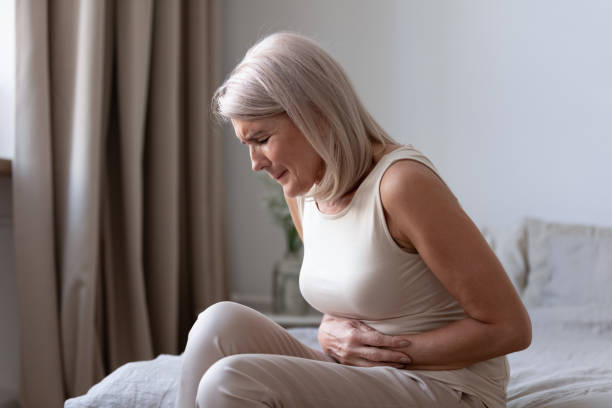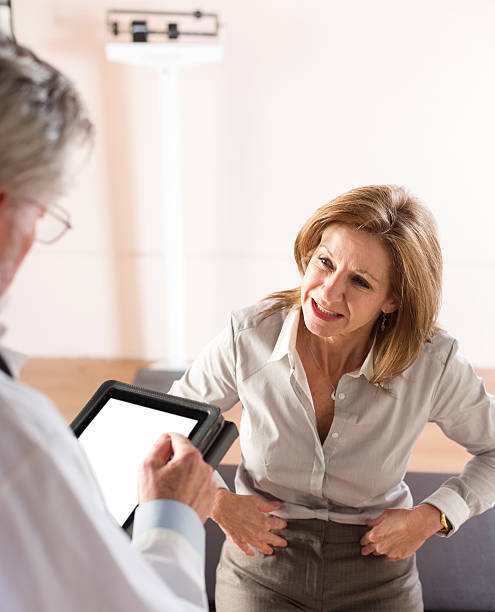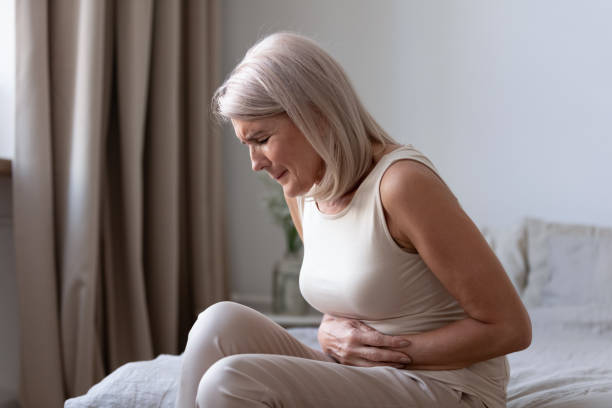|
Menopause is a natural stage in every woman’s life. It is the time when a woman stops having menstrual periods permanently and cannot get pregnant. Menopause usually happens anywhere between the ages of 40 to 55. But there are certain early warning signs that can indicate an early menopause. Menopause can be a challenging phase of your life, but it doesn’t need to be difficult if you know what to expect and how to handle it properly. When you know what symptoms to watch out for, you are able to take steps beforehand to make the transition smoother and easier than expected. Here we have listed some of the common symptoms of menopause that you should not ignore:
Irregular Vaginal Bleeding One of the most common signs of early menopause is irregular vaginal bleeding. This is usually related to a sudden drop in estrogen levels in the body. The probability of having abnormal bleeding increases if you go through a natural pregnancy, if you breastfeed, if you have had a hysterectomy, if you have been on certain medications, if you have had a significant weight gain or if you have smoked excessively in the past. During menopause, the levels of estrogen in the body drop significantly. Estrogen is responsible for regulating your reproductive cycle, including the menstrual cycle. When the levels of estrogen drop, this can cause your menstrual cycle to become irregular. This is because estrogen plays an important role in keeping your reproductive system healthy, including the lining of your uterus. Hot Flashes Another common symptom of menopause is hot flashes. Hot flashes are sudden episodes of extreme sweating and feeling very hot, followed by chills. This is a result of a sudden drop in estrogen levels in the body, which is one of the main symptoms of menopause. When estrogen levels drop, it can cause your body temperature to spike for no apparent reason. Hot flashes can occur at any time of the day, even during sleep. Although hot flashes can be uncomfortable, they are not harmful and do not lead to any long-term health issues. Hot flashes can range in severity from person to person, but most women find that the symptoms subside within a year or two after the onset of menopause. Depression and Mood Swings A sudden and unexplained change in mood is another common symptom of early menopause. When estrogen levels fall, they can affect the serotonin levels in your brain. This can cause sudden changes in mood, such as depressive episodes or mood swings, which are common side effects of menopause. Women are at a greater risk of developing mood swings and becoming depressed during menopause as compared to men, since estrogen has a significant impact on the female brain. If you experience sudden mood changes or feel unusually sad or anxious, it is important to see a doctor to rule out any other causes, such as menopause, so that you can receive proper treatment. Loss of Interest in Sex Another common symptom of early menopause is a sudden loss of interest in sex. This is also related to falling estrogen levels in the body. A sudden and unexplained loss of interest in sex could be a sign of early menopause. As you approach menopause, the level of estrogen in your body begins to drop. This can affect the health of your reproductive system, your mood, and your sex drive. When estrogen levels are reduced, this can lead to dryness and irritation in the vagina, which can make sex uncomfortable. It can also lead to hot flashes and mood changes that makes it difficult to enjoy sex. Muscles Aches and Joint Pains During menopause, a sudden increase in muscle aches and joint pains can occur, especially in the lower back, hips, and knees. This is caused by an increase in inflammation in the body, which is also related to falling estrogen levels in the body. When estrogen levels drop, it can lead to a decrease in the production of progesterone, which is responsible for controlling the level of inflammation in the body. This can cause joint and muscle pains during menopause. Constipation and Bloating An increase in bloating and constipation are two other symptoms of early menopause. When estrogen levels drop, it can lead to an increase in the amount of estrogen in the body, which can cause bloating. And when estrogen levels drop, it can also lead to a decrease in the production of progesterone, which is responsible for regulating the bowel movement. When progesterone levels drop, this can cause constipation. Menopause is a natural stage in every woman’s life. When you know the signs of an early onset of menopause, you can take the necessary steps to make the transition smoother and easier. It is important to be aware of these signs and symptoms so that you can take the necessary precautions to manage them, rather than ignoring them and hoping they will go away on their own.
0 Comments
Menopause is a natural phenomenon that almost every woman goes through in her lifetime. It is a period when the production of estrogen and progesterone hormones by the ovaries declines, leading to various physical, mental, and emotional changes. Menopause may not be easy for most women, but it’s not something you have to live with forever. There are many ways to deal with menopause. You don’t have to go through it without any help or support from your friends or family members. With the right strategies and techniques, you can find relief from its symptoms and lead a more stress-free life. Here are some helpful tips on how you can effectively manage menopause. Read on to know more.
Change your diet Although you cannot change your biological age, you can definitely change how certain symptoms of menopause affect you by what you put into your body. Eating a healthy diet will help reduce the risks of many problems associated with menopause, including heart disease, diabetes, and osteoporosis. A healthy diet also can reduce some of menopause's symptoms, including hot flashes, mood swings, and sleep problems. If you are experiencing symptoms like hot flashes or night sweats, try eating more foods that are high in calcium and vitamin B. When these nutrients are consumed in high amounts, they help reduce the frequency and severity of these problems. Dairy products and calcium supplements are excellent sources of calcium and vitamin B. They also are relatively inexpensive. Exercise regularly Physical activity can help ease the symptoms of menopause by reducing stress and increasing the production of endorphins, which are the body's natural mood-alleviating chemicals. Exercising regularly and maintaining a healthy lifestyle can also protect you against many health complications that are associated with menopause such as osteoporosis, heart disease, and diabetes. You can start with simple exercises, like walking or yoga, which can help you manage stress and improve your sleep. Exercises like tai chi, qigong, and mindful meditation can help you focus on your body and your breath, which can lower your anxiety levels and make you feel more relaxed. You can also try aerobic exercises like running and swimming, which will help stimulate your body's anti-aging hormones and improve your sleep. Take care of your mental health Menopause is a natural part of life, but you may experience anxiety and depression related to it if you don’t take care of your mental health. You can seek help from a therapist or a psychologist, who can help you manage any mental health issues you might be experiencing due to menopause. Talking to a professional can be extremely helpful because they can guide you towards the best ways to reduce your anxiety, relieve your stress and manage your emotions. They can also help you manage the changes in your life that come with menopause, such as relationship issues and changes in your family. Find a support group If you’re going through menopause, it’s important to maintain a positive outlook on life. If you’re feeling alone or isolated, you may experience drastic mood shifts. Joining a support group can help you stay motivated and connected to others who are going through the same thing as you. There are many online support groups that can help you cope with the physical and emotional symptoms associated with menopause. They can also help you deal with any issues in your personal or professional life that might be triggered by the changes that come with menopause. If you prefer joining an in-person support group, you can find one in your area by contacting your local health center. You can also talk to your friends and family members about your experience with menopause. They can be a great source of support. Don’t hesitate to try medication As a woman goes through menopause, she may experience some anxiety, mood swings, and feelings of irritability. This is normal, but it can become a problem if it worsens. If you are experiencing severe mood swings, you may want to consider taking medication to relieve your symptoms. There are many medications that you can take to manage the symptoms of menopause, such as mood swings and hot flashes. Discuss your experience with your doctor to find the right one for you. Some people believe that using medication is a sign of weakness and that it contradicts the idea of being a “real” woman. But the truth is that taking medication is a sign of strength and courage. It shows that you care enough about yourself to take care of your body and your mind. Don’t forget about self-care As you go through menopause, it’s important to take care of yourself. Eat healthy foods and get enough sleep to keep your body healthy and stress-free. Practice relaxation techniques like yoga or tai chi, and participate in activities that you enjoy such as reading and gardening. Doing things you enjoy will help reduce your stress and prevent you from feeling overwhelmed. You can also try alternative therapies such as acupuncture, acupressure, or aromatherapy to alleviate stress and promote relaxation. Having a healthy lifestyle will make managing menopause a lot easier. It will keep you healthy and help you feel energized even as you go through menopause. Many people believe that the best way to handle menopause is to ignore it. However, this is not the case. Menopause is a natural phenomenon that should be celebrated and not ignored. A woman has been through a lot to get to this stage of her life. She has faced many challenges and has achieved a lot. Going through menopause is an essential part of life, and it should be respected as such. Managing the change that comes with menopause can be trickier than it sounds. But with the right strategies and techniques, you can find relief from its symptoms, and lead a more stress-free life. Menopause or the end of menstruation is a natural stage that marks the final period in a woman’s life as a fertile individual. It is also known as the ‘change of life’ because it brings about various physical and emotional changes in women. Menopause is not just a physiological phenomenon; it also has social, sexual, and psychological implications. Menopause marks the cessation of ovulation and release of eggs from the ovaries. This results in marked reduction in production of estrogen and other hormones. Menopause usually occurs between the ages of 45 and 55 but can start as early as 40 or as late as 60. Menopause can be a difficult time for a woman; however, it doesn’t have to be that way. Here are some practical tips on what is menopause and how to deal with it:
What is Menopause? Menopause is the medical term for the cessation of menstruation. When a woman has gone 12 consecutive months without a period, it is safe to say she is in menopause. When a woman is in perimenopause — the time leading up to menopause — her body is producing less estrogen. This reduction in estrogen levels can cause a variety of symptoms that are similar to those that occur during PMS. Menopause marks the end of the fertile phase in a woman’s life. It is a natural process during which a woman’s ovaries gradually stop releasing eggs and produce less estrogen. The reduction in estrogen levels causes the reproductive organs to change, which leads to a variety of uncomfortable symptoms, including hot flashes, night sweats, and mood swings. How to deal with menopause symptoms? There are a number of natural menopause remedies that can help women deal with the symptoms of menopause. A combination of lifestyle changes, self-care practices, and herbal supplements can greatly reduce the severity of these symptoms.
Tips to manage hot flushes during menopause
How to deal with weight gain during menopause? Many women worry that they will gain weight during menopause. However, gaining weight during menopause is not inevitable. While there’s no way to prevent it, women can take a few steps to prevent weight gain and feel good about themselves.
Tips for better sleep during menopause? Insomnia is a common problem among women during the menopause stage. Some of the best ways to improve your sleep during this stage are
Menopause is a natural process that every woman experiences at some point in her life; however, it can be a trying time for many as symptoms like hot flashes, mood swings, and night sweats can be extremely uncomfortable. Fortunately, there are a number of natural menopause remedies that can help reduce the severity of these symptoms. |
Read More
All
|




 RSS Feed
RSS Feed